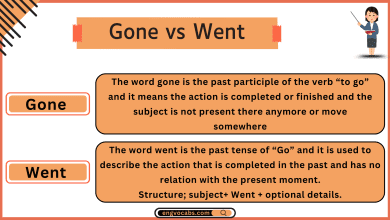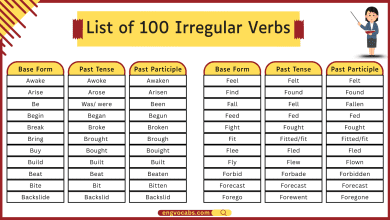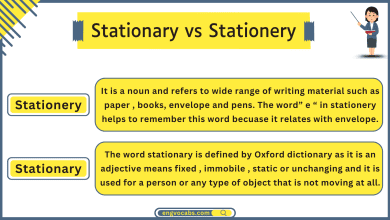Unlock Grammar: Parts of Speech with Definitions & Examples
Parts Of Speech, Types, and Examples

Parts of Speech with Definitions & Examples
In this lesson, you are going to learn 8 Parts of Speech With Definitions and Examples PDF. A good understanding of Parts of Speech will improve your spoken and writing skills in English. As you know, parts of speech are essential for grammar. If you want to strengthen your skills in English you have to strengthen your English grammar and that’s why we have come up with this article with the definition of Parts of Speech and examples. If you learn parts of speech means you can learn English very well.
Definition: Parts of Speech is a category to which a word is assigned according to its function in a sentence
What are the Parts of Speech?
Sometimes very common definitions of Parts of speech are provided by traditional Grammer. For example, it describes a noun as the name of a place, a thing or place, or a verb as a doing word. Although there is some correlation between word classes and meaning, all such definitions fall down. In actuality, whether we ascertain it or not we categorize terms very authentically by the positional and operating places they enthrall in the sentence.
By definition, Parts of Speech is the class of words that describes the role of the word in the sentence.
Examples Of Parts Of Speech:
- Someone stool the bag. (Noun)
- He gave it to her. (Pronoun).
- He is a timid baby. (Adjective)
- A snake bites his victim on the head. (Verb)
- I do my work quickly. (Adverb)
Importance Of Parts Of Speech
As you know well Parts of speech are the first topics that we learn in our School life study or when we start to learn English Grammar. Understanding Parts of Speech improves your insight to analyze the function of words. This will defiantly improve your writing skills. A good knowledge of parts of speech also improves your spoken English.
8 Parts Of Speech
Following are the 8 Parts of Speech:
1. Verb 2. Adverb 3. Adjective 4. Noun
5. Pronoun 6. Pre[position 7. Conjunction
8. Interjection
Verb With Definition And Examples
Definition:
The word verb comes from the Latin verb. The verb is part of speech that is actually the existence, action, or circumstance of a subject or an object. In other words, it is used to tell what a subject or an object does or is. In English Grammar when we discuss the verb is the heart of the sentence and is a main part of the predicate of a sentence. In various languages, it affects agreement with the subject or tense, voice, mood, or for aspect.
Examples of the verb:
- A snake bites victims on the head.
- I go to the bazaar early in the morning.
- My father is a genius.
- The car has a broken window pan.
- Sarah offered Ahmad a ten-dollar loan.
- Mr. Aslam prepared her kitchen walls with lovely wallpaper.
- He took his breakfast in the morning.
- The girl is reading a book.
If we talk about verbs here ‘has‘ shows what has been done to a thing. The grammatical forms of the verbs include numbers, person, and tense. According to different parts of speech and style, verbs change their form. Sometimes suffixes are added like ed to learn which changes it to a learned and sometimes the word changes altogether as catch changes into a caught.n The different forms of verbs show different meanings related to such things as a tense ( past, present, future ), person ( first person, second person, third person ), number ( singular, plural ), and voice ( active, passive ), and moor ods ( indicative, subjunctive, imperative ). One of the most important effects of verbs is their relationship to time. Verbs tell if the commodity has formerly happened, if it will happen later, or if it is happening now. For things happening now, we used the present tense of a verb; for something that has already happened, we use the past tense; and for something that will happen later, we use the future tense.
Adverbs With Definitions And Examples
Definition:
The adverb comes from the Middle English adverb and from the Latin adverbium. In English Grammar an adverb modifies a verb, an adjective, another adverb, a phrase, or a clause. We can say that, an adverb indicates adverb of manner, time, place, cause, or degree of an adverb and different answers to questions such as “How “, “When”, “Where”, and “How much”.
Examples of the adverb:
- I do my work quickly.
- We are going there to attend the funeral.
- He speaks very aggressively.
- He hit me very hard.
- He ran fast.
- I will visit him tomorrow hopefully.
Many adverb end with the suffix “ly“. Most adverbs are created by adding “ly“ to the end of an adjective. such as:
| Adjective | Adverb | Adjective | Adverb | Adjective | Adverb |
| Hard | Hardly | Hopeful | Hopefully | Aggressive | Aggressively |
However, this is not a reliable and good way to find out whether a word is an adverb or not, for two main reasons: So sometimes or many, adverbs don’t end in “ly”, and many verbs which are not Adverbs do end in ” ly” such as kindly, friendly, elderly, and lonely, which are adjectives. Here are some examples of Adverbs which are the same as adjectives.
| Adjective | Adverb | Adjective | Adverb | Adjective | Adverb |
| Fast | fast | late | late | early | Early |
The best way to tell if a word is an Adverb is to try making a question, for which the answer is the word. If the question uses, where or when then the word is probably an Adverb. Here is an example:
| Word In Context | Question | Adverb/Adjective |
| He nicely does his work. | How does he work? | How–Adverb |
| They have good neighbors. | What kind of neighbors do they have? | What kind of-Adjective |
Commonly Used Adverbs:
Here, there away, up– WHERE
Now, then, later, soon, yesterday, –WHEN
Easily, quietly, slowly, quickly–HOW
Never, always, often, seldom-– HOW OFTEN
Very, almost, too, so, really— TO WHAT EXTENT

Adjective With Definitions and Examples
Definition:
The word Adjective comes from Late Latin adjectives means to add to. It is part of speech that modifies a noun and it’s examples, pronoun types, or another origin This is called a modifier. Moreover.it gives more information about what the Noun or Pronouns refer to. It is distinguished in English morphologically by one of several suffixes, such as -able, -ous, and, -est, or syntactically by position directly preceding a noun, nominal phrase, or pronoun.
Examples:
- I have a red pencil.
- He is a timid baby.
- I saw six different kinds of sheep grazing in the meadow.
- The car has a broken window pan.
- Zara is a smart girl.
- Ali is a clever boy.
What Is a Noun? Definition And Examples
Definition:
In English Grammar word when we talk about nouns, Noun comes from the Latin nomen meaning ‘name’. A word used as the designation or application of a creature or a thing, existing in fact or in thought; substantive.
It is part of speech that is used to name a person, place, thing, action, or an abstract idea such as feeling or quality and can function as the noun describes a subject in English Grammar or the object of a verb, the object of a preposition, or an appositive.
Examples:
Someone stole the bag\noun
Word order can pinpoint the presence of Nouns, For example, in the following sentence, it is clear that the part of speech that will fit into blank ‘a’ and blank ‘b’ must be Nouns;
a—-hit—b
- Mr. Asim lives in London.
- Ahmad ordered a large burger.
- The capital of Pakistan is Islamabad.
- The zoo was full of people.
- Zara is a smart girl.
- Ali is a clever boy.
Pronouns Examples And Definition
Definition:.
The word Pronoun comes from Late Middle English, a partial translation of Latin prenomen. A pronoun can replace a Noun or another noun. It gives more information about what the noun or pronoun refers to. Moreover, a Pronoun is the part of speech that is used as a substitute for an antecedent noun that is clearly understood, and with which it agrees in the person, number, and gender.
Examples:
- I do my work quickly.
- We are going there to attend the funeral.
- I will visit him tomorrow.
- He speaks very aggressively.
- He hit me very hard.
- He ran fast.
Prepositions Types And Examples
Definition:
The word Preposition comes from Latin preposition, from prepone means to, place before’…means ‘before’+ponere means’ to put or place’. A preposition may be described as connecting words showing the relation of a noun or a pronoun substitute to some other word in the sentence. Prepositions are used to express several relationships including time, direction, location, cause, manner, purpose, and state or condition.
Examples:
- He rushed to the bus.
- He came by bus.
- I sat on the chair.
- I sat in the chair.
- She placed the rostrum table on the stage.
- I read for an hour.

Conjunction With Many Examples
Definition:
Here we will discuss conjunction, actually in English Grammar conjunction join two sentences.The word conjunction comes from Latin conjunction, which means ‘a joining’. In a grammatical sense, it is a translation of the Greek word sundress which means, ‘binding together’. A conjunction is a joiner; a word that connects words, phrases, or sentences.
Examples:
- Mr. Asim lives in London and Mr. Ali in the USA.
- Ahmad ordered a very large burger while he was not hungry.
- He will drive or fly.
- It is very early in the morning but we can go whatsoever.
Interjection With Definition And Examples
Definition:
The word interjection literally means”thrown in between” and comes from the Latin word inter meaning ‘between’ and sincere meaning’throw’. In English Grammar an interjection is part of speech that usually has no grammatical connection to the rest of the sentence but interjection simply expresses emotion on the part of the speaker, although most introjections have clear definitions.
An interjection is usually followed by an exclamation mark.
Examples:
- Ouch, that hurts.
- O no, I forgot that it was my mother’s birthday today.
- Hy! Put the chair down.
- Hurrah, we won the match.
- Oh, alas, ah ( for regret).
- Bravo! We are going on a trip.

Small Exercise To Check Your Understanding Of Parts Of Speech
- We came home late at night.
- You are a good girl.
- This is the car We were looking for.
- OO! This is an amazing car.
- He is a timid baby.
- He rushed to the bus.
- Hy! Put the chair down.
- I have a red pencil.
- Mr. Asim lives in London.
Now let you see if you got it right. Check Your Answers
- We-Pronoun, home-Noun, Late-Adverb
- You-Pronoun, are- Helping verb, Good-Adjective
- We-Pronoun, Were looking- Verb
- He- Pronoun, timid-Adjective
- OO-Interjection, Amazing-Adjective
- To- Preposition
- Hy- Interjection,
- Red pencil-Adjective
- Asim-Noun
Frequently Asked Questions About Parts Of Speech
Q1 What Are Parts Of Speech?
Sometimes very common definitions of Parts of speech are provided by traditional Grammer. For example, it describes a noun as the name of a place, a thing or place, or a verb as a doing word. Although there is some correlation between word classes and meaning, all such definitions fall down. In actuality, whether we ascertain it or not we categorize terms very authentically by the positional and operating places they enthrall in the sentence.
Q2 What Are Parts Of Speech?
As you know well Parts of speech are the first topics that we learn in our School life study or when we start to learn English Grammar. Understanding Parts of Speech improves your insight to analyze the function of words. This will defiantly improve your writing skills. A good knowledge of parts of speech also improves your spoken English.
Q3 How Many Parts Of Speech Are There?
These 8 Parts Of speech in total.
Q4 What Are The Parts Of Speech?
Nouns, Pronouns, Verb, Adverb, Conjunction, Adverb, Adjective And Interjection are the 8 parts of speech.


